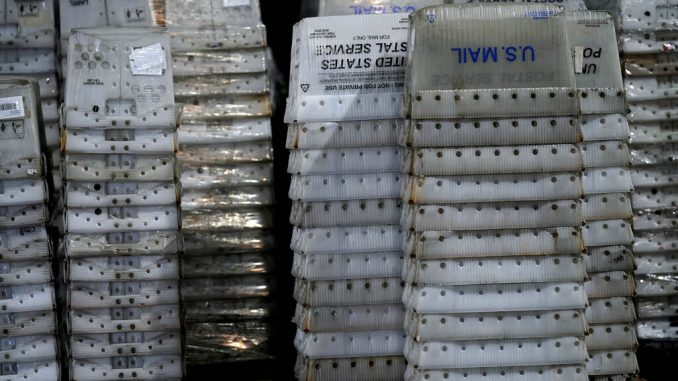
RALEIGH — North Carolina election officials agreed to significant changes regarding absentee by-mail ballots returned this fall without correct information. The board agreed to count those ballots regardless of some errors, instead of having the voter to return a legal ballot. The change, if it stands, would likely yield more incomplete ballots to be counted.
The N.C. State Board of Elections issued the new guidance to county boards explaining residents don’t need a witness to sign or provide an address on the envelope containing their absentee ballot, according to the settlement.
Marc Elias, a Democratic lawyer who has filed multiple lawsuits to loosen absentee ballot rules in North Carolina and other states, praised the decision.
“The steps (the board) agreed to take will enfranchise tens of thousands of voters, or more,” tweeted Elias, who represented the left-leaning North Carolina Alliance for Retired Americans in the lawsuit.
The absentee ballot adjustments are part of a proposed joint settlement filed in Wake County court between the State Board of Elections and the alliance, a union-affiliated group. The alliance argued that restrictive absentee rules burdened their right to vote during the COVID-19 pandemic, in violation of the state constitution.
Republican legislative leaders who had intervened in the lawsuit blasted the agreement by the board. They contended the Democrats colluded to weaken absentee laws approved overwhelmingly by the General Assembly. A judge is being asked to accept the settlement. The GOP lawmakers could go to court to stop its enforcement, which if successful would stop the radical changes.
“These actions are utterly lawless and we are reviewing them to assess all of our legal options,” House Speaker Tim Moore said in a news release. The five-member board is controlled by appointees of Democratic Gov. Roy Cooper.
From over 7 million registered voters in North Carolina, nearly 950,000 mail-in ballots already have requested for and more than 153,000 ballots have already been returned and accepted for counting as of Tuesday morning, according to state data.
The state said about 1,700 ballots had been returned with incomplete witness information, making it the most common reason that ballots weren’t accepted.
The lawsuit was bankrolled by the National Redistricting Foundation, a Democratic group whose parent committee is led by former Attorney General Eric Holder.
Senate Leader Phil Berger (R-Eden) said of the agreement, “Can you imagine the reaction if President Trump and Attorney General Barr went into a backroom and rewrote election laws weeks before the election? I cannot overstate how unethical this collusive behavior is. The Board of Elections, which is controlled by Gov. Cooper and acting through its lawyer, Democratic Attorney General Josh Stein, went around the legislature and agreed with Democratic plaintiffs to undo basic election laws passed to prevent a repeat of actual absentee ballot fraud.”
Another absentee ballot lawsuit that was filed said voters with missing witness information were being treated differently than those who simply failed to sign the envelope containing their completed ballot. They could sign an affidavit. Now under Tuesday’s settlement, those with missing witness information also can correct the issue by signing an affidavit.
The agreement with the North Carolina Alliance also says county board officials will now accept absentee ballots received through Nov. 12.
And county election boards will make it easier for people to turn in their absentee ballots or those of a relative at early in-person voting sites across the state when they open in mid-October. The voter or relative won’t have to fill out a voting log, but rather an election worker will now be able to do it for them.
“Voters deserve certainty,” Circosta said in a statement. “We have ensured that our election process is secure and accessible.”
Republican lawmakers said the changes weaken rules approved following evidence of absentee ballot fraud in a 2018 congressional race that led to a brand new election. The changes were approved in a near-unanimous vote in the General Assembly and signed by Cooper.
Berger also said, “If approved, this action shatters confidence in the Board of Elections’ intent to fairly conduct this election. We knew they would play around on the margins to give Democrats an edge, but this is a full-frontal assault on election integrity laws.”
The Associated Press contributed to this report.



